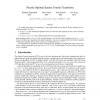Free Online Productivity Tools
i2Speak
i2Symbol
i2OCR
iTex2Img
iWeb2Print
iWeb2Shot
i2Type
iPdf2Split
iPdf2Merge
i2Bopomofo
i2Arabic
i2Style
i2Image
i2PDF
iLatex2Rtf
Sci2ools
174
click to vote
STOC
2012
ACM
2012
ACM
Nearly optimal sparse fourier transform
We consider the problem of computing the k-sparse approximation to the discrete Fourier transform of an ndimensional signal. We show: • An O(k log n)-time randomized algorithm for the case where the input signal has at most k non-zero Fourier coefficients, and • An O(k log n log(n/k))-time randomized algorithm for general input signals. Both algorithms achieve o(n log n) time, and thus improve over the Fast Fourier Transform, for any k = o(n). They are the first known algorithms that satisfy this property. Also, if one assumes that the Fast Fourier Transform is optimal, the algorithm for the exactly k-sparse case is optimal for any k = nΩ(1) . We complement our algorithmic results by showing that any algorithm for computing the sparse Fourier transform of a general signal must use at least Ω(k log(n/k)/ log log n) signal samples, even if it is allowed to perform adaptive sampling.
Related Content
| Added | 28 Sep 2012 |
| Updated | 28 Sep 2012 |
| Type | Journal |
| Year | 2012 |
| Where | STOC |
| Authors | Haitham Hassanieh, Piotr Indyk, Dina Katabi, Eric Price |
Comments (0)

